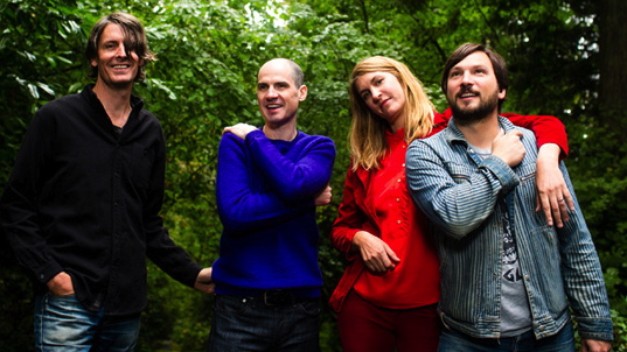"Lariat" is boilerplate Jicks. Despite being ostensibly upbeat -- even "ebullient" -- the song skates ahead softly with that same graceful melancholy that's been following Stephen Malkmus around since at least Terror Twilight (and frankly haunts much of Brighten The Corners too after they dispense with the fact-checkin' cuz). It rides in with those twisty guitar noodles that have always been his steez but have only gotten twistier and more noodly in the post-Pavement era. It is, as ever, a showcase for his unmistakable voice and distinctive diction, that impossibly talky way he sticks his melodies on you like a wad of gum under his desk. Just as typically, it's rife with non-sequiturs that demand you project your own meaning on them because their true significance could not possibly be discerned ("I wouldn't jerry-rig or candy-coat your Latin kisses"?). It deflects the recognizable human sentiment the same way all those shrieks and whimpers obscure his gift for melody. Like I said, boilerplate Jicks.
If Malkmus is making music more or less like he always has, he's also playing the role he always plays: the meta rock star. The guy has shrugged and winked his way through his entire career, casting knowing glances at his audience and trolling the "elegant bachelors" who take the business of rock stardom far more seriously. The first single from the forthcoming Wig Out At Jagbags represents a new stage for that persona. Now that the music of his formative era has aged into classic rock status, Malkmus has moved on from playacting the young stud rock 'n' roller to lampooning the jaded music veteran who glorifies his glory years. "Lariat" is meta-nostalgic.
It's a well-documented phenomenon: Most music fans tend to think of their coming-of-age years as the peak of musical history, a culmination of creative progress that will never be surpassed. They just don't make 'em like they used to, it's all downhill from here, kids these days, etc., etc., etc. Malkmus might be on that wavelength here. Between the gibberish about chariots and some possibly heartfelt reflections on the evolution of romance ("A love like oxygen/ So foxy then, so terrific now"), he spends a significant portion of "Lariat" recounting old favorites from his college years. He big-ups Mudhoney, Bongwater, Sun City Girls, and the Grateful Dead -- his apparent UVA soundtrack for dining on deer meat and reading poetry -- before proclaiming, "We grew up listening to the music from the best decade ever."
This being Malkmus, the line is delivered with enough of a sideways grin to undercut its sincerity but not enough sarcasm to render it a complete joke. He probably does think the '80s (or "the ADDs" -- pun!) were the best decade ever, but he also realizes how cliche that sentiment sounds coming from a 47-year-old man in 2013. He seems to be mocking his nostalgia and celebrating it all at once, which isn't so far from the slapdash classic rock pastiche of "Silence Kid," the goofball sentimentality of "Spit On A Stranger," or the ironic prog-rock of "1% Of One." He is embracing this stage of life like all the rest: one step removed, lest anyone lose sight of the absurdity of it all.
In a twist that Malkmus would surely savor, by staying faithful to his signature sound, "Lariat" takes on another layer of meta-nostalgia. Whereas Malkmus and David Berman blasted the Fall at their campus radio station, I distinctly remember losing myself in Crooked Rain, Crooked Rain in the backseat on the way to a college visit and pulling all-nighters to Pig Lib in my dorm room. The best song I ever wrote for my old college band was a baldfaced Malkmus ripoff, and when Pavement reunited in 2010, I was too thrilled about the chance to see those songs performed live to care whether the band had their hearts in it or not. For those of us who count Malkmus's records among our own personal canon, "Lariat" is absolute comfort food. His music so profoundly shaped my taste -- and is so charged with memories -- that the appeal of a song like this is practically Pavlovian. I'm a lot younger than Malkmus, and I feel as silly romanticizing the past as he does, but his song about the good old days flashes me back to the good old days. Very meta; very Malkmus.
[videoembed size="full_width" alignment="center"][/videoembed]






